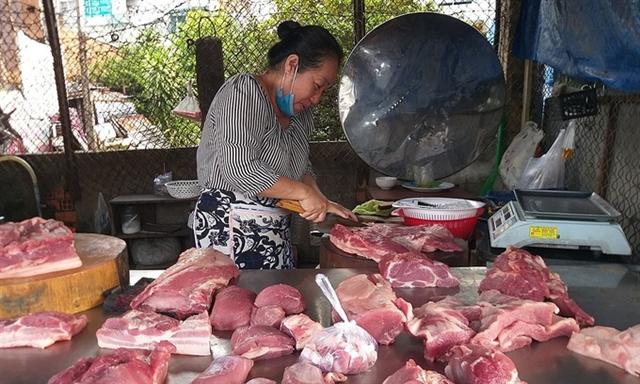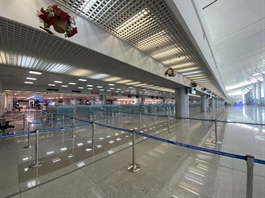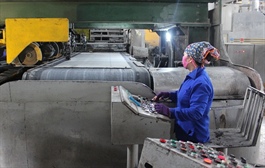Citizens, businesses hurt as rising prices raise inflation concerns
Citizens, businesses hurt as rising prices raise inflation concerns
Experts say the government will find it difficult to rein in inflation this year as surging food and materials prices hurt citizens and businesses.
A butcher cuts meat in a market in Ho Chi Minh City. Photo by VnExpress/Thi Ha.
|
Loan and her husband in HCMC’s District 5 spent around VND120,000- 200,000 ($5.22-8.70) per day last month on feeding their family of three, almost double that of the same time last year. They say the prices of vegetables and meat have been increasing since the beginning of the year.
Hoa, another HCMC resident, has seen her spending on family meals increase by 65 percent to VND5 million per month. She says the prices of cooking gas and many ingredients she needs have been rising.
"The prices of some products have doubled since the beginning of the year. I’m spending out of my savings."
Ngoc Chau, head accountant for a construction company in Tan Binh District, has seen prices of a bowl of noodle soup rising nearly 20 percent to VND65,000 the past few months.
"I have been reluctant to eat out these days."
In the first four months of this year, the prices of materials and ingredients have risen by 4.64 percent year-on-year, with the surge strongest in the agriculture, forestry and fisheries sector, up 6.77 percent, according to the General Statistics Office.
The GSO has cautioned that although inflation was 0.29 percent in the first quarter, the lowest in 20 years, keeping it under the targeted 4 percent this year won’t be easy as many economies including the U.S. have introduced economic stimuli to boost recovery.
The Ministry of Agriculture and Rural Development said that animal feed prices have surged 30 percent since the beginning of the year and is set to rise further in the second quarter.
Fuel prices, meanwhile, have increased by 19 percent since the beginning of the year.
Do Van Khuoi, director of supplies at Saigon Food, said that prices have been rising due to limited supply of goods domestically and shortage of materials globally.
There are signs that some suppliers are increasing their reserves to indulge in speculative pricing, he added.
"Disrupted supply chains due to difficulties in transporting goods amid the pandemic have also pushed up prices."
Khuoi said that in recent months, the prices of spices have risen by 5-10 precent, rice and seafood by 5-20 percent and material for plastic production by 15-70 percent.
A spokesperson for food processor Vissan also said that many food companies were facing "headaches" because of rising material prices. Some suppliers have requested a 15 percent increase starting this month.
Most businesses say they are trying to look for alternative sources of materials and ingredients to lower prices.
Authorities have also been working to stabilize prices.
Pham The Anh, head economist of the Vietnam Institute for Economic and Policy Research (VEPR), said that Vietnam and many other economies face high risks of rising inflation this year as prices of some products like steel and fuel have been surging at around 20-30 percent.
Economist Nguyen Duc Thanh said that authorities are facing difficulties in controlling inflation, as keeping prices low will hurt businesses which are already hit by the Covid-19 pandemic, while allowing prices to rise will hurt low-income people.
The domestic department market under the Ministry of Industry and Trade said it has been working with businesses to ensure adequate supply to keep prices from surging suddenly.
It has also been working with customs and agriculture authorities to ensure the stable delivery of goods, especially between localities with a high number of Covid-19 cases.
Deputy Prime Minister Le Minh Khai has also ordered relevant government bodies to take keep fuel prices stable.


























